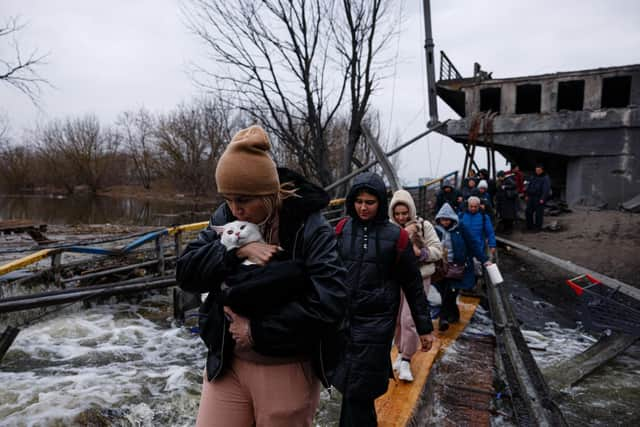Lent and the Easter story of resurrection's relevance to Ukraine - Bill Carmichael
Russian tanks rolled into Ukraine on February 24, just a few days before the beginning of Lent on Ash Wednesday, and since then we’ve been subjected to a daily litany of horrors – murders and rapes of civilians, bodies dumped in mass graves, schools and hospitals, and even a maternity unit, targeted by Russian forces, perhaps deliberately.
Sometimes it has been difficult not to fall into despair at the cruelty inflicted by the Russians on a people they see as their ethnic and cultural brothers and sisters.
Advertisement
Hide AdAdvertisement
Hide AdOf course it is a rare year when there isn’t a war going on somewhere in the world, and sadly today there are plenty of other bloody conflicts underway, from Yemen, to Ethiopia, Sudan and Syria to name just a few.


But the conflict in Ukraine is literally closer to home – it is little over three hours by plane from the UK to Kyiv – so it feels as if this catastrophe is unfolding right on our doorstep.
And there are some grim echoes of previous wars on the European mainland. For example if you take some of the photographs of the current conflict and turn them into black and white images, they become almost indistinguishable from pictures of the Second World War.
Those echoes become all the louder when the US President Joe Biden accuses the Russians – with plenty of justification – of committing genocide, as he did this week. In a speech in Iowa President Biden said that evidence of genocidal acts by Russian troops was mounting, and the Russian leader Vladimir Putin was trying to “wipe out the idea” of Ukrainian identity.
Advertisement
Hide AdAdvertisement
Hide AdOther than impotent hand wringing is there anything we can do? Well, yes of course, and it has been heartening to see the response of the British people who have raised millions of pounds for humanitarian assistance.
Many people have also offered their homes to house Ukrainian refugees fleeing the conflict. The response to the war and suffering has overwhelmingly been one of generosity and hospitality.
We can also take some pride in the actions of the UK Government, which has been at the forefront of supplying the Ukrainians with the military hardware needed to defend themselves, as well as playing an important part in international efforts to sanction and isolate the kleptocratic Russian regime.
The war in Ukraine should be a loud wake-up call for Western democracies, as it has demonstrated just how shaky is our grip on our essential liberties.
Advertisement
Hide AdAdvertisement
Hide AdIf Vladimir Putin succeeds in Ukraine there is little doubt he will soon turn his imperialist ambitions towards Estonia, Latvia and Lithuania, and that would drag Nato into a wider – possibly nuclear – conflict.
In response there needs to be a profound change of policy throughout the Western democracies, particularly in the fields of energy and defence.
Our European allies, especially Germany and France, need to finally commit to spending serious cash on defence and to drop the preposterous idea of a “EU army”. When faced with the growing Russian threat, Nato, backed by American muscle, is the only game in town.
In terms of energy the “green dream” – which actually increased carbon emissions by burning lots of Russian coal and gas – is over. In today’s uncertain world, security of domestic supply matters far more than environmental concerns.
Advertisement
Hide AdAdvertisement
Hide AdLater this evening, like millions of others, I will attend church where the altar has been stripped bare and the crosses and crucifixes covered with a purple cloth, and I will offer a prayer for the people of Ukraine as I have done throughout Lent. I am troubled by a question I cannot answer – do my prayers matter? Do they make any difference?
Well, the best I can say is that they matter to me, and I will take heart from the Easter story of resurrection and the triumph of good over evil, and I will pray that this is played out in Ukraine one day soon.
And I will think of those wretched people huddled in the basements of Mariupol, short of water, food and medicine, desperately hoping that the next Russian missile does not bring the apartment block above crashing down on them.
There is a verse from a famous old Charles Wesley hymn that we sing at this time of year, which keeps running through my mind and which seems apt at this moment:
“Long my imprisoned spirit lay,
Fast bound in sin and nature’s night;
Thine eye diffused a quick’ning ray,
I woke, the dungeon flamed with light;
My chains fell off, my heart was free;
I rose, went forth and followed Thee.”